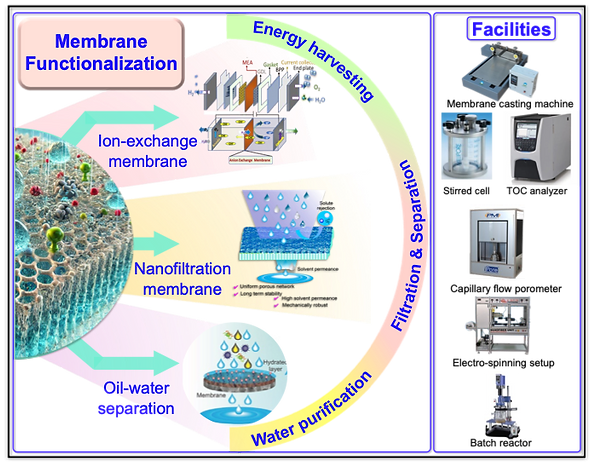Department of Materials Science & Engineering
Indian Institute of Technology Delhi, New Delhi-110016, India
Our aim is to design cutting-edge functional materials and membranes with tailored properties by leveraging the flexibility of polymer chemistry and nanomaterials versatility. Our core focus spans on four distinct and interdisciplinary domains:
-
Nanoporous & functional membranes for separation & purification
-
Functional nanomaterials for sustainable catalysis
-
Polymer synthesis and new materials for energy storage application
-
Soft & responsive materials for biochemical and biocatalysis

Nanoporous & functional membranes for separation & purification
Our research group at IIT Delhi focuses on the design and development of advanced nanoporous and functional membranes for cutting-edge separation and purification applications. Leveraging tailored polymer chemistries, supramolecular assemblies, and nanomaterial integration, we engineer membranes with precise pore architectures, selective transport properties, and responsive functionalities.
Our work spans a range of critical applications, including water purification, ion and gas separation, organic solvent nanofiltration, and selective molecular sieving. Special emphasis is placed on stimuli-responsive membranes, antifouling surfaces, and hybrid membranes incorporating metal–organic frameworks (MOFs), covalent organic frameworks (COFs), and functional nanofillers. These efforts contribute toward sustainable chemical processes, clean water technologies, and next-generation energy systems.

Functional nanomaterials for sustainable catalysis
We are focussing on the development of functional nanomaterials for sustainable and high-performance catalysis. Our research focuses on rational design and synthesis of nanostructured catalysts—including single-atom catalysts, doped carbon materials, and hybrid metal–organic frameworks—for applications in energy conversion, environmental remediation, and green chemical synthesis.
We emphasize catalytic systems that are earth-abundant, cost-effective, and environmentally benign, targeting key reactions such as electrochemical water splitting, CO₂ reduction, and pollutant degradation. By integrating surface engineering, defect modulation, and interfacial tuning, we strive to uncover structure–function relationships that drive catalytic efficiency and selectivity under mild conditions.

Functional nanomaterials for sustainable catalysis
Our group develops advanced polymers and hybrid materials for energy storage applications. We focus on phase change materials (PCMs) for thermal energy storage, designing encapsulated and polymer-supported systems with high thermal stability and efficiency. Additionally, we work on aqueous organic redox flow batteries (AORFBs) using tailor-made redox-active polymers to enable safe, scalable, and sustainable energy storage. Our efforts combine polymer synthesis, nanomaterials, and device integration to address key challenges in clean energy technologies.

Soft & responsive materials for biochemical and biocatalysis
Our group develops soft, stimuli-responsive materials such as hydrogels, microgels, and colloidosomes for advanced biochemical sensing and biocatalysis. These materials are engineered to respond to environmental triggers like pH, temperature, or specific biomolecules, enabling controlled reactivity and selective interactions.
We also work on enzyme-loaded soft carriers and hybrid polymer systems for enhanced catalytic efficiency and recyclability in green synthesis. A key thrust of our research is toward point-of-care (POC) diagnostic platforms, including the development of responsive materials and membranes for nucleic acid amplification tests (NAATs) that offer rapid, low-cost, and sensitive detection of biomolecular targets.
These technologies have broad implications for healthcare, biosensing, environmental monitoring, and sustainable chemical processing.

